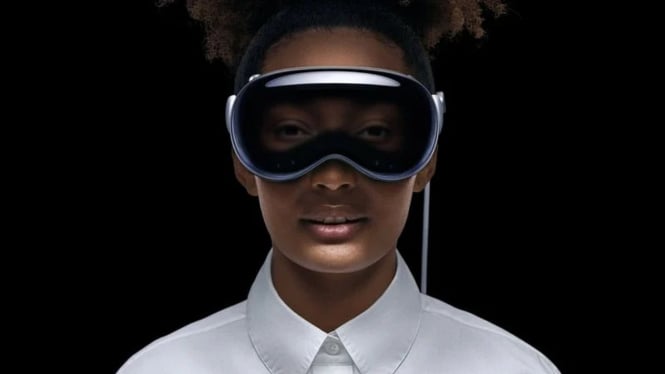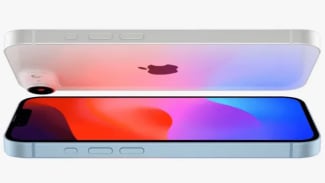Apple Introduces Vision Pro AR Headset as Spatial Computer
- Apple
VIVA – Apple has introduced the 'Vision Pro' headset, its first mixed reality device and visionOS, the new operating system for the device.
The Vision Pro headset is considered a revolutionary spatial computer that seamlessly blends digital content with the physical world. The device has a new operating system that features a three-dimensional interface.
The experience of using Vision Pro is not limited by the boundaries of the display, users can create applications at any scale and place applications wherever they want. With a combination of eyes, hands, and voice, users can control the device.
Apple
- 1486395
Apple Vision Pro will be sold for US$ 3,499 or around IDR 52 million per unit. For such a fantastic price, Apple claims users will get a "seamless" experience between the real and the digital world.
The headset is made of glass and aluminium with five sensors, 12 cameras, 4K display for each eye, and a mini-computer with fan cooling system.
The entire front of the headset is made of polished glass down to the lightweight aluminum frame. The top of the headset features buttons and a Digital Crown that allows users to control how present or immersed they are in an environment.
The headset has a modular system for optimal fit. The battery is separate and connected via a magnetic connection to the side of the headset.
A piece of three-dimensionally printed and laminated glass is polished to create an optical surface that acts as a lens for the various cameras and sensors needed to blend the physical world with digital content.
The glass flows into a custom aluminum alloy frame that curves gently around the user's face. While the modular system allows for customized adjustments to accommodate a wide variety of people.
The Light Seal is made of soft textile and comes in a variety of shapes and sizes, flexing to fit the user's face. The flexible strap ensures the audio stays close to the user's ears.
While the Head Band, available in different sizes, is three-dimensionally knitted as a unit to provide cushioning, breathability and flexibility.
Those who wear glasses should use the magnetic ZEISS prescription inserts with the Vision Pro headset.
Vision Pro has an ultra-high-resolution display system with 23 million pixels across two micro-OLED screens - more than 4K for TV for each eye.
It uses high-speed cameras and LED rings that project invisible light patterns into the user's eyes to track gaze. The headset also contains an M2 chip paired with a new 'R1' chip, dedicated to real-time sensor processing.
Apple
- 1486393
These innovations are powered by Apple silicon in a unique dual-chip design. The M2 delivers unrivaled standalone performance, while the new R1 chip processes inputs from 12 cameras, five sensors and six microphones to ensure content feels like it's appearing right in front of the user's eyes, in real time.
The R1 streams new images to the screen within 12 milliseconds, eight times faster than the blink of an eye.
Apple Vision Pro is designed for all-day use when plugged in and up to two hours of use with a high-performance external battery.
The device also has a new Spatial Audio system with two individually amplified drivers inside each audio pod, delivering personalized Spatial Audio based on the geometry of the user's head and ears.
The gadget can match the sound to the environment using audio ray tracing. The device is capable of running for two hours on a single charge.
The headset features passthrough video of the wearer's eyes in a feature Apple calls 'EyeSight', showing the user's eyes to those around them. It is also known to use a lenticular OLED display.
Vision Pro can turn any space into a personal movie theater and watch immersive videos. Users can expand beyond the dimensions of physical space with dynamic landscapes that can help them focus.
Optical ID uses the wearer's iris to authenticate the user and unlock the Vision Pro headset. Vision Pro is also 'Apple's first 3D camera', displaying video depth with Spatial Audio.























